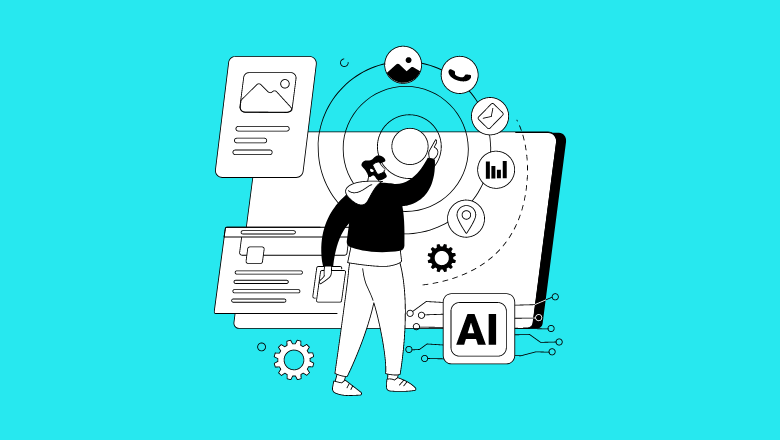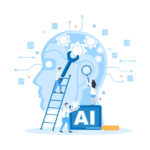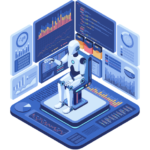How to manage AI engineers: cultivate a supportive environment, set clear expectations, and encourage creative problem-solving.

In the rapidly evolving world of technology, artificial intelligence (AI) has become a crucial component of innovation. AI engineers are highly sought-after professionals with the skills and expertise needed to develop cutting-edge solutions.
As a manager, it’s essential to understand how to manage AI engineers effectively, ensuring the success of your team and organization.
How to Manage AI Engineers: Best Practices
1. Foster a Collaborative Environment
A key takeaway in managing AI engineers is fostering a collaborative environment. Encourage team members to share ideas, provide feedback, and work together to find innovative solutions. Collaboration promotes creativity and can lead to breakthroughs in AI development.
Exemplify: Organize regular brainstorming sessions or hackathons to stimulate collaboration among team members.
Pro tip: Utilize collaborative tools such as Slack, Trello, or GitHub to streamline communication and project management.
2. Encourage Skill Development and Education
AI engineers must possess a diverse set of skills to excel in their field. As a manager, it’s crucial to encourage your team members to pursue continuous learning and professional development.
Exemplify: Offer opportunities for in-house training, workshops, or online courses to help your engineers broaden their skillset.
Pro tip: Create a culture of learning by setting aside time for team members to explore new concepts, technologies, and research.
3. Provide Clear Goals and Expectations
To ensure the success of your team, it’s essential to provide clear goals and expectations. This allows AI engineers to focus on the tasks at hand and prioritize their workload effectively.
Exemplify: Set specific, measurable, achievable, relevant, and time-bound (SMART) goals for each project or task.
Pro tip: Regularly review and adjust goals to align with the evolving needs of your organization and the AI industry.
4. Offer Flexible Work Arrangements
AI engineers often work on complex projects that require focus and concentration. By offering flexible work arrangements, you can help your team maintain a healthy work-life balance while remaining productive.
Exemplify: Allow your team members to work remotely or adopt flexible hours that suit their individual needs.
Pro tip: Implement time tracking and project management tools to monitor progress and ensure accountability.
5. Recognize and Reward Achievements
Lastly, recognizing and rewarding the achievements of your AI engineers can boost morale and foster a sense of accomplishment.
Exemplify: Celebrate milestones, project completions, or innovative solutions with small tokens of appreciation or team events.
Pro tip: Implement a performance-based rewards system, such as bonuses or promotions, to acknowledge outstanding contributions.
Becoming a Successful AI Engineer: Skills, Education, and Salary
To become a successful AI engineer, one must possess a range of skills, including programming, machine learning, data analysis, and problem-solving. Additionally, a strong foundation in mathematics and statistics is crucial for understanding complex algorithms.
While a degree in computer science, engineering, or a related field is often required, it’s possible to become an AI engineer without a degree by acquiring relevant skills and certifications. The AI engineer roadmap may include online courses, boot camps, or self-study.
In 2021, the average AI engineer salary ranged from $100,000 to $150,000 per year, depending on experience and location. This lucrative field continues to grow, making it an attractive career path for aspiring engineers.
Daily Life of an AI Engineer
AI engineers work on a variety of tasks daily, including designing, building, and testing AI systems. They may also
collaborate with cross-functional teams, analyze data, and optimize algorithms. A typical day might involve researching new techniques, refining existing models, and presenting findings to stakeholders.
Key Takeaway: The daily life of an AI engineer is dynamic and requires adaptability, critical thinking, and strong communication skills.
Exemplify: AI engineers may work on projects like developing autonomous vehicles, creating virtual assistants, or improving facial recognition technology.
Pro tip: Embrace the ever-changing nature of AI and remain open to learning new methods and tools.
Unique Angle: Managing AI Engineers with Emotional Intelligence
A unique angle for managing AI engineers is incorporating emotional intelligence (EQ) into your leadership style. AI engineers, like any professionals, have emotional needs and personal aspirations. Understanding and addressing these needs can lead to a more engaged and productive team.
Key Takeaway: Emotional intelligence can enhance your ability to manage AI engineers by fostering trust, open communication, and job satisfaction.
Exemplify: Actively listen to your team members’ concerns, offer support, and provide constructive feedback to help them grow professionally and personally.
Pro tip: Invest time in building relationships with your team members, understanding their goals, and creating an environment where they feel valued.
The Importance of Ethical AI Development
A crucial aspect of managing AI engineers that only seasoned experts would emphasize is the importance of ethical AI development. With the increasing influence of AI in various aspects of life, ensuring that the technology is developed responsibly is paramount.
Key Takeaway: Promote ethical AI development within your team to create solutions that are fair, transparent, and respectful of user privacy.
Exemplify: Establish ethical guidelines for your team, such as avoiding biased data sets or implementing privacy-preserving techniques in your AI models.
Pro tip: Encourage open discussions about the ethical implications of AI projects, fostering a culture of responsibility and accountability.
Cultivating a Growth Mindset
Another aspect that only experienced AI professionals would highlight is the importance of cultivating a growth mindset among team members. In a rapidly evolving field like AI, embracing challenges, learning from setbacks, and continuously seeking improvement are critical for long-term success.
Key Takeaway: Encourage a growth mindset within your team, fostering resilience, adaptability, and a continuous drive for improvement.
Exemplify: Celebrate learning experiences, even when they stem from failure, and motivate your team to view challenges as opportunities for growth.
Pro tip: Provide regular feedback and support to help your team members develop a growth mindset and navigate the ever-changing landscape of AI.
Leveraging Domain Expertise
As an AI manager with extensive experience, it’s crucial to recognize the value of leveraging domain expertise when developing AI solutions. Collaborating with experts in specific fields can significantly enhance the impact and effectiveness of AI applications.
Key Takeaway: Encourage your team to collaborate with domain experts to develop more targeted, relevant, and effective AI solutions.
Exemplify: If your team is working on a healthcare-related AI project, involve medical professionals to ensure the developed models consider domain-specific nuances.
Pro tip: Facilitate cross-disciplinary collaboration by organizing workshops or seminars where domain experts can share their insights and knowledge with your AI engineers.
In conclusion
Managing AI engineers effectively requires a combination of technical knowledge, leadership skills, and emotional intelligence. By fostering a collaborative environment, encouraging skill development, providing clear goals, offering flexible work arrangements, and recognizing achievements, you can ensure the success of your team and organization.
Additionally, understanding the daily life, skills, and educational requirements of AI engineers can help you better support their professional development and career aspirations.
Remember that incorporating emotional intelligence into your management style can lead to a more engaged, motivated, and productive team, ultimately contributing to the growth and success of your organization.
Jane Watson is a seasoned expert in AI development and a prominent author for the “Hire AI Developer” blog. With over a decade of experience in the field, Jane has established herself as a leading authority in AI app and website development, as well as AI backend integrations. Her expertise extends to managing dedicated development teams, including AI developers, Machine Learning (ML) specialists, and other supporting roles such as QA and product managers. Jane’s primary focus is on providing professional and experienced English-speaking AI developers to companies in the USA, Canada, and the UK.
Jane’s journey with AI began during her time at Duke University, where she pursued her studies in computer science. Her passion for AI grew exponentially as she delved into the intricacies of the subject. Over the years, she honed her skills and gained invaluable experience working with renowned companies such as Activision and the NSA. These experiences allowed her to master the art of integrating existing systems with AI APIs, solidifying her reputation as a versatile and resourceful AI professional.
Currently residing in the vibrant city of Los Angeles, Jane finds solace in her role as an author and developer. Outside of her professional pursuits, she cherishes the time spent with her two daughters, exploring the beautiful hills surrounding the city. Jane’s dedication to the advancement of AI technology, combined with her wealth of knowledge and experience, makes her an invaluable asset to the “Hire AI Developer” team and a trusted resource for readers seeking insights into the world of AI.







